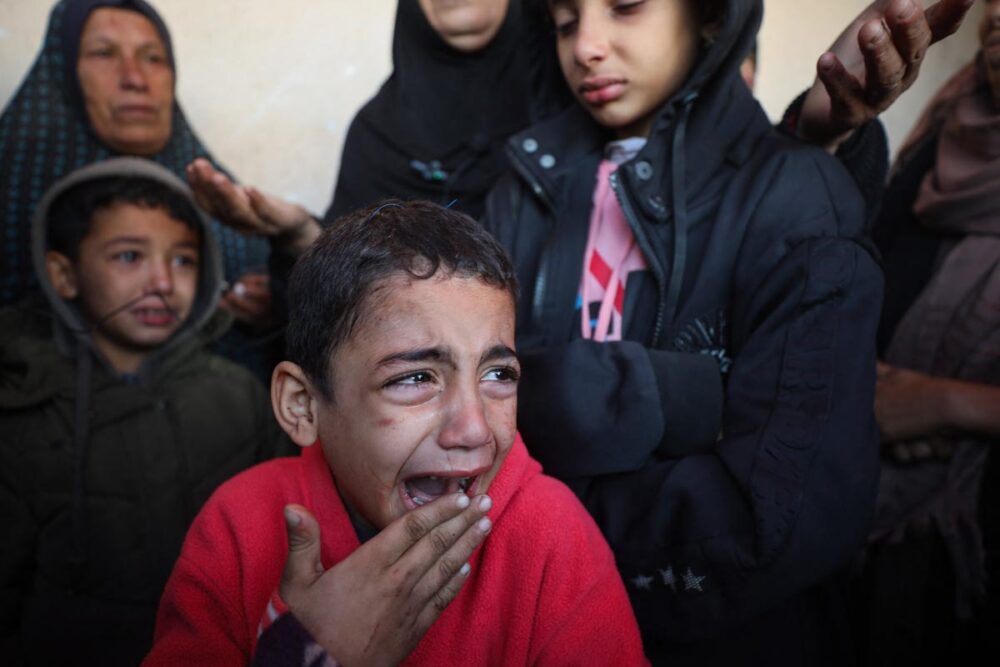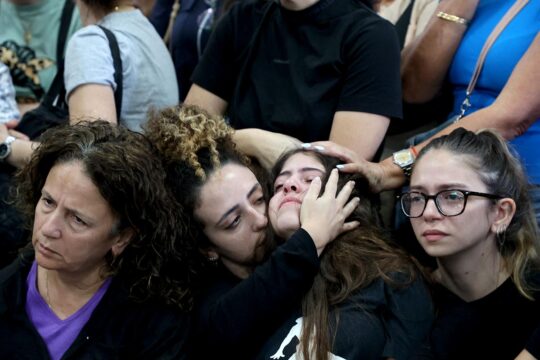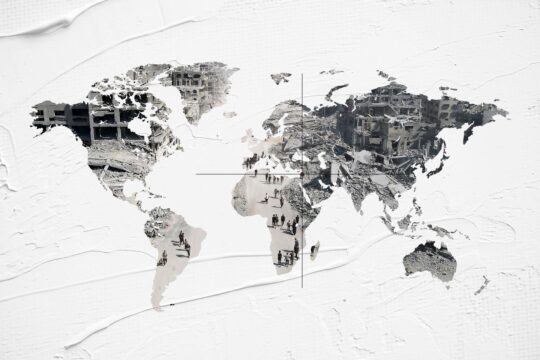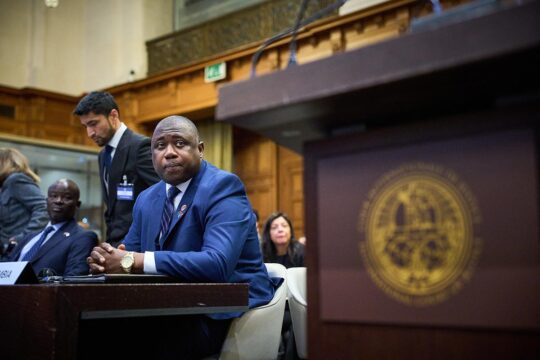If you had regularly attended hearings before the International Court of Justice (ICJ), there would have been familiar faces among the lawyers presenting the arguments that took place last week about Israel’s obligations as an occupying state and as a member of the United Nations. There is a strong cross-over with those who have previously argued on the separate case brought by South Africa under the Genocide Convention against Israel – a case that has resulted in several provisional measures ordered by the ICJ requiring Israel to provide the means of survival to the civilian population of the Gaza Strip, amid the assault of the Israeli army on Hamas since October 7, 2023.
This requested advisory opinion by the UN general assembly, however, is different from both the genocide case and last years’ advisory opinion on Israel’s responsibilities as an occupying power. Last year’s only addressed issues up to October 2023, before the attack by Hamas, notes Wim Muller, an Assistant Professor of Public International Law at Maastricht University. While this one is in response to the current circumstances in Gaza as described once again by the head of UN agency in charge of humanitarian affairs and emergency relief (OCHA) on May 3: “Blocking aid starves civilians. It leaves them without basic medical support. It strips them of dignity and hope. It inflicts a cruel collective punishment. Blocking aid kills,” said Tom Fletcher in a written address to “those who can still reason with” the Israeli authorities.
“That's why the UN general assembly explicitly asked the court for expedited hearings,” says Muller, “as a direct response to the unfolding humanitarian crisis in Gaza.” But in the end, all these different cases, each having their own restrictions and limitations, make up “a kind of puzzle” in relation to the Israeli-Palestinian conflict, says Muller. And indeed there was a repetition in evidence presented to the court of the ongoing tragedy, with more recent details on the intensity of the threats to Palestinian women and children and the daily toll of deaths and injuries doctors have witnessed and are unable to treat.
“Gaza is now home to the largest cohort of child amputees in the world, the largest orphan crisis in modern history, and a whole generation in danger of suffering from stunting, causing irreparable physical and cognitive impairments; over 15,600 children have been killed violently. Tens of thousands more of Gaza’s children are injured or missing, and many of those surviving are so traumatised that they openly express the wish to die,” Irish lawyer Blinne Ní Ghrálaigh, previously representing South Africa in the genocide proceedings, told the court on behalf of Palestine. A video from Dr Muhamad Mustafa, an Australian doctor who was volunteering in Gaza last March, was played, in which he said: “The bombing has been non-stop. We’ve run out of ketamine, we’ve run out of Propofol, we’ve run out of all painkillers. We can’t sedate anyone, we can’t give them any analgesia. When we intubate people, they wake up and they’re choking because we have no sedation. There are seven girls getting their legs amputated, no anesthesia… It was just mostly women and children, burnt head to toe, limbs missing, heads missing.”
Israel’s isolation
Juliette McIntyre, a lecturer in law at the University of South Australia, says the court’s role is important because it gets to reaffirm the rules for everyone, including for states which might be tempted to not provide UN access. “It's like a tug of war. Every time you get a state that disobeys or breaches a norm, the norm is weakened because other states see you getting away with it and they think ‘oh I could do that too’. When the court comes along and restates the norm, the norm is strengthened.”
Some 40 states and international organizations have affirmed in written and oral submissions to the court that Israel has a legal duty to allow aid into the Gaza Strip and to cooperate with the UN's aid agency for Palestine, UNRWA, which was created in 1949 after the creation of the state of Israel, to support the Palestinian refugees spread in camps across several countries.
In October 2024 Israel’s parliament, the Knesset, banned the agency. In its legal submissions to the ICJ Israel says the UN body is a security threat. Many states in their submissions pointed out that allegations about UNRWA’s lack of neutrality and its infiltration by Hamas have been independently investigated and the agency has been absolved while it was implementing reforms. But Jerusalem provided a 37-page written submission to the court, in which UNWRA is referenced 278 times. “UNRWA’s failure to abide by its mandate and to uphold the fundamental principles of neutrality, impartiality, and independence, which the UN has long acknowledged are essential to the provision of humanitarian assistance, is as indisputable as it is egregious,” it says. The paper argues that Israel is entitled to end cooperation with the organisation for the sake of its own security.
Israel’s position is that it is following international law. It was backed by submissions from the US and Hungary. “What's really interesting about this one,” says McIntyre, “is just how very straightforward the law is and how everyone, except for the US and Hungary, agrees.” Including countries like Russia and China, which is “kind of unusual,” she says. Muller says it shows how isolated Israel’s legal position has become. “It seems that it's kind of losing the argument,” he says.
Is anything not clear?
The continued use of the ICJ for both contentious cases and the request for advisory opinions is striking. “More states are finding their way to the courts and they're making submissions even when you might wonder why they are devoting their resources to this,” says Muller. “It just shows that they do see the court as a legitimate form, to present their views and to make them known on the international legal stage.”
Many of the arguments were about reparations, acknowledged McIntyre. “The one thing that is most interesting about this case is how not interesting it is, which is that everyone is there to say the same thing. The law on occupation is very clear. The law about immunities is extremely clear. There's really not much in the way of wriggle room here.”
So how are judges likely to rule? “It's obviously always hard to predict,” says Muller. But because of the specific way the question has been formulated – “What are the obligations of Israel, as an occupying Power and as a member of the United Nations, in relation to the presence and activities of the United Nations, including its agencies and bodies, other international organizations and third States, in and in relation to the Occupied Palestinian Territory, including to ensure and facilitate the unhindered provision of urgently needed supplies essential to the survival of the Palestinian civilian population as well as of basic services and humanitarian and development assistance, for the benefit of the Palestinian civilian population, and in support of the Palestinian people’s right to self-determination?” –, the court could treat it narrowly, by just reaffirming the law. Or, Muller says, “the context gives the potential to rule on a very broad scope because it even includes a reference to the Palestinian right to self-determination. You can also tell from the way some states have responded to it and the kind of submissions that they've made that some of them also take it very, very broadly, even going into all kinds of remedies.”
Three of the ICJ judges asked questions during the week-long hearing specifically about the current Israeli blockade. “It's possible that in light of the factual background that the court takes one further step and rules a bit more broadly than we might expect,” says Muller. “The court is aware of the context. It is just answering the question while at the same time being well aware of the politics around it,” says McIntyre.
Meanwhile, Israel has leaked details of a new plan for delivering humanitarian supplies to Gaza that would cut UNWRA out completely. The proposal, which may be approved at Sunday’s Israeli cabinet meeting, has already been widely rejected by aid agencies. Muller speculates that in response, “if Israel manages to come up with another way that also satisfies legal standards, that might have some influence in the sense that it might narrow the scope or it might make the court more inclined to spare Israel in one way or the other in its opinion. I do think that it could play a role because the court tends to be quite pragmatic as well. »








